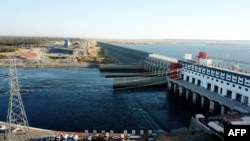A Chinese electricity company and the Cambodian and Chinese governments are being urged to review compensation packages for Indigenous and ethnic minority communities after a Human Rights Watch report found their lives had been undermined by dam construction.
The 138-page report, “Underwater: Human Rights Impacts of a China Belt and Road Project in Cambodia,” found that local authorities and the state-owned China Huaneng Group had largely ignored community concerns over construction of the Lower Sesan II dam.
"The Lower Sesan II dam washed away the livelihoods of Indigenous and ethnic minority communities who previously lived communally and mostly self-sufficiently from fishing, forest-gathering and agriculture," said John Sifton, Human Rights Watch Asia advocacy director.
Indigenous, other ethnic minorities affected
Indigenous peoples and other ethnic minorities affected by the project in northeast Cambodia include people of the Bunong, Brao, Kuoy, Lao, Jarai, Kreung, Kavet, Tampuan, and Kachok communities.
Sifton, who authored the report, said people had been coerced into accepting inadequate compensation for lost property and income and provided with poor housing and services at resettlement sites, and they had not been given any training or assistance to help secure new livelihoods.
"Cambodian authorities need to urgently revisit this project's compensation, resettlement and livelihood-restoration methods and ensure that future projects don't feature similar abuses," he said.
Upstream areas flooded
A government spokesman declined to comment on the report, one of many that accompanied construction of the dam — by far the largest in Cambodia — that flooded areas upstream of the Sesan and Srepok rivers, both tributaries of the Mekong River.
Cambodian and Chinese officials, however, have been quick to rebut criticisms, arguing that the Lower Sesan II dam provided jobs, access roads for isolated communities and electricity needed to improve standards of living in a developing country.
Sreng Sataro, minister counselor of the Embassy of Cambodia in China, recently told China's Global Times that Cambodians had benefited from 55 projects initiated with the dam that support a range of activities in areas including rural development, water resources, agriculture and education.
"It also brings roads that bring them to markets or take their children to better schools because of the project. But many of them are uneducated people who are easily misled by some Western-supported NGOs (nongovernmental organizations) who only spread negativity.
"They do not realize how these infrastructure projects have brought people out of poverty and have provided them actual benefits," he said.
Project completed by 2018
Lower Sesan II was completed by the operator, China Huaneng, in 2018 at a cost of $782 million, with Chinese government banks providing most of the financing. Cambodia's Royal Group and Vietnam's state-owned electricity company EVN hold minor stakes.
The report said authors had documented economic, social and cultural rights violations resulting from the displacement of nearly 5,000 people whose families had lived in the area for generations, as well as impacts on the livelihoods of tens of thousands of others upstream and downstream.
The report included interviews with more than 60 community members, civil society leaders, academics, scientists and others who researched the project, and it reviewed academic studies, business records and research by NGOs and other sources.
Communities suffered
It said that fishing income had been depleted by falling yields and that agriculture also suffered after communities were moved to less fertile ground. Well water at most resettlement sites was contaminated and undrinkable.
China Huaneng had not established an effective grievance mechanism to resolve disputes, the report found, and officials repeatedly dismissed community concerns. Some people who objected were threatened or even jailed.
Sifton said communities upstream and downstream of the dam had also not received compensation or assistance, and he urged the Chinese government to undertake more systemic reforms to avoid abuses in future projects associated with its Belt and Road Initiative (BRI).
"The Chinese government needs to drastically reform Belt and Road infrastructure development financing to prevent abuses in other projects undertaken in countries like Cambodia, where the government has a long track record of abusing citizens' rights," he said.
Lack of follow-through
Bradley Murg, a senior research fellow at the Cambodian Institute for Cooperation and Peace, said scholars were divided over whether the Lower Sesan II dam was part of the BRI, given that its construction began two years before Chinese President Xi Jinping launched the initiative.
"Generally, what we have seen is that responsibility for this lies with the Chinese firm, the firm that's doing the project itself, rather than the Royal Government, despite whatever agreement might exist," Murg said.
"And we have seen prior evidence in other cases — in cases that came subsequently — of lack of follow-through in terms of promises made to the local population as regards to compensation and relocation."




